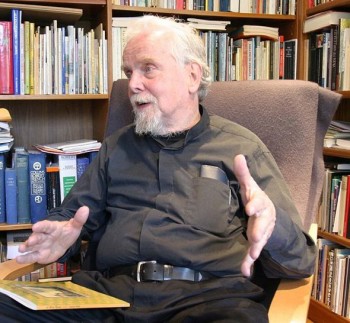Search results for "jarkko laine prize"
Jarkko Laine Prize 2011
1 June 2011 | In the news
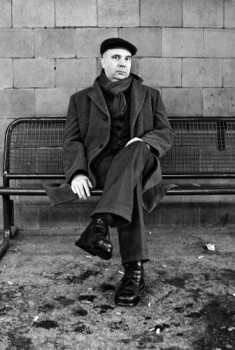
Juha Kulmala. Photo: Lotta Djupsund
The Jarkko Laine Literary Prize (see our news from 6 May), worth €10,000, was awarded to Juha Kulmala (born 1962) on 19 May for his collection of poems entitled Emme ole dodo (‘We are not dodo’, Savukeidas, 2009).
The prize is awarded to a ‘challenging new literary work’ published during the previous two years. Shortlisted were also two novels, Kristina Carlson’s Herra Darwinin puutarhuri (‘Mr Darwin’s gardener’, Otava, 2009) and Erik Wahlström’s Flugtämjaren (‘Fly tamer’, Finnish translation Kärpäsenkesyttäjä, Schildts, 2010).
Jarkko Laine (1947–2006) was a poet, writer, playwright, translator, long-time editor of the literary journal Parnasso and chair of the Finnish Writers’s Union.
New from the archives
19 February 2015 | This 'n' that
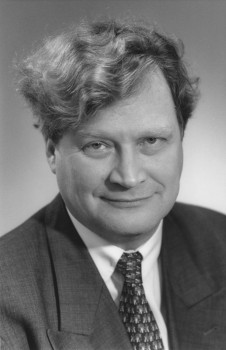
Jarkko Laine. Photo: Kai Nordberg
Our archive find this week is ‘The 101 year anniversary celebration’, a short story by Jarkko Laine.
‘Child of Marx and Coca-Cola’, ‘Nordic beatnik’, Jarkko Laine (1947-2006) published his first work, a volume of poetry entitled Muovinen Buddha (‘Plastic Buddha’) in the 1960s and was immediately hailed as the mouthpiece of his generation. He went on to make his career as a literary all-rounder – poet, writer, playwright, translator, long-time editor of the literary magazine Parnasso and chair of the Finnish Writers’ Union. His wryly ironic story, ‘The 101 year anniversary celebration’ tells the story of what every writer must dread: a guest appearance in a local library where literature from the local town, let alone further afield, is regarded with suspicion.
We’ve also unearthed a 1989 interview, by our late, genial editor-in-chief Erkka Lehtola with a grey-suited Laine who looks more like a civil servant than a 1960s radical – but still doesn’t let a day go by without writing.
*
The digitisation of Books from Finland continues apace, with a total of 360 articles and book extracts made available online so far. Each week, we bring a newly digitised text to your attention.
Jarkko Nieminen: Pelaamisen lumo [The fascination of the game]
20 August 2009 | Mini reviews, Reviews
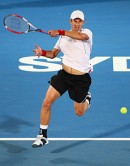 Pelaamisen lumo [The fascination of the game]
Pelaamisen lumo [The fascination of the game]
Helsinki: Avain, 2009. 175 p., ill.
978-952-5524-69-7
€ 38, hardback
Tennis is a curious game, as everyone who plays it knows – and even those who don’t, which is why it is such a popular sport. Although Jarkko Nieminen (born 1981), a professional player since 2000, has not yet won a Grand Slam event for Finland, in 2006 he was ranked no. 13. (Unfortunately, this spring Nieminen injured his wrist and missed the top matches of the season.) In this book (edited and published by his sister Anna-Riikka Carlson, who founded the publishing company Avain in 2003), Nieminen tells the story of his athletic career. ‘In Japan my visa said I was an “entertainer”,’ he recalls as he describes what it’s like to walk out on a court filled with thousands of spectators. Tennis is a gentleman’s game, a polite duel (or double), and Nieminen is certainly a gentleman par excellence. His personal story is designed to be strictly informative, as he chooses to keep his family life private, for example (his wife Anu, née Weckström, a Finnish multiple badminton champion, is referred to once). There is no doubt, though, that the reader will be convinced of Nieminen’s happy choice of an athletic profession.
Martin Panelius & Risto Santti & Jarkko S. Tuusvuori: Käsikirja [The hand book]
8 May 2014 | Mini reviews, Reviews
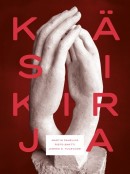 Käsikirja
Käsikirja
[Handbook]
Helsinki: Teos, 2013. 761 pp., ill .
ISBN 978-951-851-523-7
€37, hardback
Human development and human life are in many ways linked to the hand – and yet we seldom think about its significance. In their accessibly written and comprehensive Käsikirja, Emeritus Professors Martin Panelius and Risto Santti are joined by researcher Jarkko S. Tuusvuori in considering the body’s upper extremity from various points of view. The authors’ expertise in their own fields – neurology, anatomy and philosophy – set the book’s tone, but it goes far beyond these. The structure and functions of the hand are examined, as are its phylogeny, its neural networks, its aging process, its use in skills, and the injuries and illnesses that threaten it. The book deals with the hand’s connection with language and communication, its social significance, and the importance of human touch. There are a great many details, terms and names, but the artwork, the beautiful layout, the examples and the literary selections enliven the narrative. A multi-faceted achievement, Käsikirja is a refreshingly original work of non-fiction.
Translated by David McDuff
New literary prize
6 May 2011 | In the news
A new literary prize was founded in 2010 by an association bearing the name of Jarkko Laine (1947–2006) – poet, writer, playwright, translator, long-time editor of the literary journal Parnasso and chair of the Finnish Writers’s Union.
The Jarkko Laine Literary Prize will be awarded to a ‘challenging new literary work’ published during the previous two years. The jury, of nine members, will announce the winner on 19 May.
The shortlist for the first prize is made of Kristina Carlson’s novel Herra Darwinin puutarhuri (‘Mr Darwin’s gardener’, Otava, 2009), Juha Kulmala’s collection of poems, Emme ole dodo (‘We are not dodo’, Savukeidas, 2009) and Erik Wahlström’s novel Flugtämjaren (‘Fly tamer’, Finnish translation Kärpäsenkesyttäjä, Schildts, 2010).
The prize money, €10,000, comes jointly from the publishing houses Otava, Otavamedia and WSOY, the Haavikko Foundation, the City of Turku and the University of Turku.
Mishaps, perhaps
30 September 1976 | Archives online, Fiction, poetry
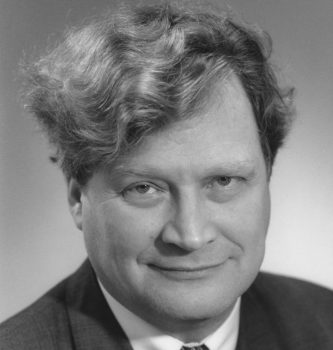
Jarkko Laine. Photo: Kai Nordberg
Jarkko Laine (born 1947) writes both prose and verse. He is the author of several hilarious and highly imaginative novels and a pioneer of the generation of Finnish underground poets. One of the most productive of younger Finland’s poets, he draws on the language and forms of mass commercial entertainment, comics, and pop music to write about people of today.
He is currently the editorial secretary of the literary periodical Parnasso. The poem below is from his latest collection Viidenpennin Hamlet (‘Fivepenny Hamlet’, Otava 1976)
![]()
1
In Turku again
the taxi’s travelling East Street
whose wooden sides have gone,
the radio’s laryngeal with static, VHF, the driver’s
telling me the tale,
the ice hockey season’s on us already,
even though there’s rain, green in the park,
I’m staring at the lifted houses
stuffed with sleeping persons,
the landmarks are going out one by one, all of them,
you might as well be
in the middle of the sea in a rubber dinghy,
soon I shan’t recognize anything here but
the cathedral, the castle,
my own name in the telephone directory. More…
Living inside language
23 February 2010 | Essays, Non-fiction
Jyrki Kiiskinen sets out on a journey through seven collections of poetry that appeared in 2009. Exploring history, verbal imagery and the limits of language, these poems speak – ironically or in earnest – about landscapes, love and metamorphoses
The landscape of words is in constant motion, like a runner speeding through a sweep of countryside or an eye scaling the hills of Andalucia.
The proportions of the panorama start to shift so that sharp-edged leaves suddenly form small lakeside scenes; a harbour dissolves into a sheet of white paper or another era entirely. Holes and different layers of events begin to appear in the poems. Within each image, another image is already taking shape; sensory experiences develop into concepts, and the text progresses in a series of metamorphoses. More…
Praise and prize for theatre on the edge of Europe
29 April 2011 | In the news
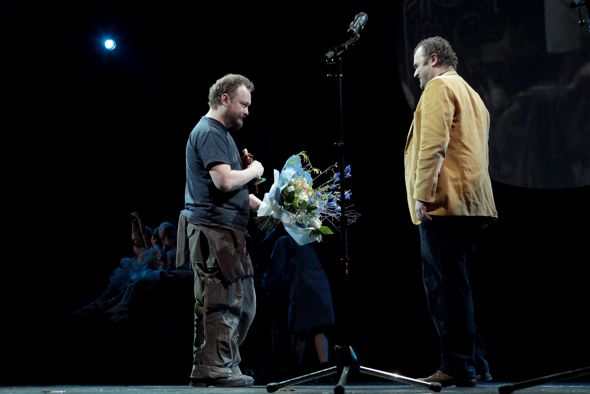
Kristian Smeds is awarded the XII Europe Prize of New Theatrical Realities in St Petersburg on 17 April, presented by a previous prize-winner, Italian theatremaker Pippo Delbono. Photo: rossetti/phocusagency
Theatremaker Kristian Smeds (born 1970) was awarded the XII Europe Theatre Prize for New Theatrical Realities in St Petersburg on 17 April. The prize, worth 30,000 euros, was – this time – divided between six prominent theatremakers or theatre groups. (For more information, see the Premio Europa website.)
The international prize jury consists of representatives of many institutions of the field. Since 1986 the main prize, the Europe Theatre Prize (worth 60,000 euros), has been awarded to 14 European theatremakers considered influential – among them, the directors and/or writers Ariane Mnouchkine, Peter Brook, Heiner Müller, Lev Dodin, Harold Pinter, and now, the German director Peter Stein. More…
Sofi Oksanen wins the 2008 Finlandia Prize
10 February 2009 | In the news

Sofi Oksanen. - Photo: Toni Härkönen/WSOY.
The Finlandia Prize for Fiction, Finland’s most prestigious literary prize, was awarded to Sofi Oksanen’s novel Puhdistus (‘Purge’, WSOY, 2008). ‘When the concentrated focus of drama and the multidimensionality of narrative conjoin, Puhdistus is born – a muscular, harsh, and solid book’, said the writer and critic Pekka Tarkka awarding the prize on 4 December. (For a short review, see the Review section.)
The prize, worth € 30,000, was awarded for the twenty-fifth time. The final choice was made from the shortlist of six candidates; the others were 14 solmua Greenwichiin (‘14 knots to Greenwich’, Otava) by Olli Jalonen, Kosmonautti (‘The cosmonaut’, Tammi) by Katri Lipson, Marie (Otava) by Arne Nevanlinna, Kohtuuttomuus (‘Excess’, Siltala) by Pirkko Saisio and Paholaisen haarukka (‘The Devil’s fork’, WSOY) by Juha Seppälä. More…
The Finlandia prizes: Non-fiction, Junior
28 November 2013 | In the news

Ville Kivimäki. Photo: Pertti Nisonen
The Finlandia Prize for Non-Fiction 2013, worth €30,000, was awarded on 21 November to the historian Ville Kivimäki for his book Murtuneet mielet. Taistelu suomalaissotilaiden hermoista 1939–1945 (‘Broken minds. The battle ofor the nerves of Finnish soldiers 1939–1945’, WSOY).
The other works on the shortlist of six were as follows: 940 päivää isäni muistina (‘940 days as my father’s memory’, Teos; a book on Alzheimer’s disease) by Hanna Jensen, Kokottien kultakausi: Belle Epoquen mediatähdet modernin naiseuden kuvastimina (‘The golden era of the cocottes: the media stars of Belle Epoque as mirrors of modern femininity’, Finnish Literature Society) by Harri Kalha, Viipuri 1918 (‘Vyborg 1918’, Siltala) by Teemu Keskisarja, Suomi öljyn jälkeen (‘Post-oil Finland’, Into) by Rauli Partanen, Harri Paloheimo and Heikki Waris and Vapaalasku – tieto, taito, turvallisuus (‘Freestyle – knowledge, skill, safety’, Kustannus Oy Vapaalasku) by Matti Verkasalo, Jarkko-Juhani Henttonen and Kai Arponen.
The prize-winner was chosen by the director of the Ateneum Art Museum, Maija Tanninen–Mattila. In her celebratory speech she said: ‘The symptoms of many psychologically disturbed soldiers remained untreated during the war. For many, their symptoms appeared only after the war. Their experiences have remained unexpressed in language, the history of those who lack history. Ville Kivimäki has given voice to these experiences… and succeeded in writing a book that speaks across the generations.’
In his acceptance speech Ville Kivimäki (born 1976) commented: ‘The great majority of the war generation is now dead, and the words of a youngish scholar cannot, even when successful, reach those traumatic experiences whose depth we can never fully understand. But all the same, I would like to take this opportunity to say something that should have been said years ago: the psychological injuries of the war were war wounds in exactly the same sense as physical ones. In the end anyone could suffer a psychological breakdown.’

Kreetta Onkeli. Photo: Jouni Harala
The Finlandia Junior Prize 2013 was awarded on 26 November, also worth €30,000. It went to Kreetta Onkeli for her book Poika joka menetti muistinsa (‘The boy who lost his memory’, Otava).
Arto, 12, gets such a massive fit of laughter that he loses his memory and needs to find his identity and his home in contemporary Helsinki.
The winner was chosen from the shortlist of six by Jarno Leppälä, a media personality and member of the popular stunt group Duudsonit, the Dudesons. At the award ceremony he said:
‘Poika joka menetti muistinsa is, in my opinion, a well-written story about how young people in society are put on the same starting line and expected to do equally well in all circumstances – often irrespective of the fact that their starting points may actually be very different, and completely independent of the young people themselves.’
Kreetta Onkeli (born 1970) explained in her award speech how her aim was to write a proper, old-fashioned novel for children: ‘Not hundreds of pages of magic tricks but ordinary, real contemporary life that children could identify with.’ In her opinion the current, massive trend of fantasy has narrowed the scope of children’s literature.
The following five books made it on to the shortlist: Poika (‘The boy’, Like), about a boy who feels he was born in the wrong gender by Marja Björk, Hipinäaasi, apinahiisi (onomatopoetic pun, ‘Donkeymonkey’, Tammi), about bullying and friendship, written by Ville Hytönen and illustrated by Matti Pikkujämsä, Isä vaihtaa vapaalle (‘Father on his own time’, WSOY), an illustrated story about children with too busy parents, written by Jukka Laajarinne and illustrated by Timo Mänttäri, Aapine (‘ABC’, Otava), an illustrated primer written by Heli Laaksonen in her own south-western dialect and illustrated by Elina Warsta and Vain pahaa unta (‘Just a bad dream’, WSOY) by graphic designer and writer Ville Tietäväinen and his daughter Aino, a book on a child’s nightmares.
Finlandia literary prizes are awarded by Suomen Kirjasäätiö, The Finnish Book Foundation, established in 1983.
The first Finlandia Prize for Fiction was awarded in 1984. This year it will be announced on 3 December.
Nordic prize
11 December 2009 | In the news
The Finnish nominees for the Nordic Council’s Literary Prize, to be awarded in March 2010, are the novels Puhdistus (‘Purge’, the winner of the Finlandia Prize for Fiction in 2008) by Sofi Oksanen, and Glitterscenen (‘The Glitter Scene’, 2009) by Monika Fagerholm.
The prize, worth €47,000, will be selected by a jury from a shortlist of 11 works from the Nordic countries. The most recent Finnish winner of the prize was Kari Hotakainen’s Juoksuhaudantie (‘Trench Road’, which also won the Finlandia Prize for Fiction) in 2004.


